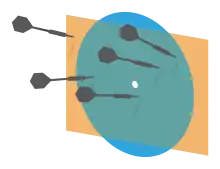Gaussian correlation inequality
The Gaussian correlation inequality (GCI), formerly known as the Gaussian correlation conjecture (GCC), is a mathematical theorem in the fields of mathematical statistics and convex geometry. A special case of the inequality was published as a conjecture in a paper from 1955;[1] further development was given by Olive Jean Dunn in 1958.[2][3] The general case was stated in 1972, also as a conjecture.[4]

The inequality remained unproven until 2014, when Thomas Royen, a retired German statistician, proved it using relatively elementary tools. The proof did not gain attention when it was published in 2014, due to Royen's relative anonymity and that the proof was published in a predatory journal.[5][6] Another reason was a history of false proofs (by others) and many failed attempts to prove the conjecture, causing skepticism among mathematicians in the field.[2]
The conjecture, and its solution, came to public attention in 2017, when reports of Royen's proof were published in mainstream media.[2][7][8]
The problem
The Gaussian correlation inequality states:
Let be an n-dimensional Gaussian probability measure on , i.e. a multivariate normal distribution, centered at the origin. Then for all convex sets that are symmetric about the origin,
As a simple example, one can think of darts in the plane distributed according to a multivariate normal distribution. If we are considering a circle and a rectangle, both centered at the origin, then the proportion of the darts landing in the intersection of both shapes is no less than the product of the proportions of the darts landing in each shape.
Royen's proof of the conjecture generalizes it, as well as demonstrating the same statement for the gamma distribution.
References
- Dunnett, C. W.; Sobel, M. Approximations to the probability integral and certain percentage points of a multivariate analogue of Student's t-distribution. Biometrika 42, (1955). 258–260.
- Wolchover, Natalie (March 28, 2017). "A Long-Sought Proof, Found and Almost Lost". QUANTA magazine. Retrieved April 4, 2017.
- Schechtman, G.; Schlumprecht, T.; Zinn, J. On the Gaussian Measure of the Intersection. The Annals of Probability, Vol. 26, No. 1, 346–357, 1998.
- Das Gupta, S.; Eaton, M. L.; Olkin, I.; Perlman, M.; Savage, L. J.; Sobel, M. Inequalitites on the probability content of convex regions for elliptically contoured distributions. Proceedings of the Sixth Berkeley Symposium on Mathematical Statistics and Probability (Univ. California, Berkeley, Calif., 1970/1971), Vol. II: Probability theory, pp. 241–265. Univ. California Press, Berkeley, Calif., 1972.
- "Pushpa Publishing House". www.pphmj.com. Retrieved 4 July 2017.
- Royen, T. (5 August 2014). "A simple proof of the Gaussian correlation conjecture extended to multivariate gamma distributions". arXiv:1408.1028 [math.PR].
- Farand, Chloe (2017-04-03). "Retired man solves one of hardest maths problems in the world and no one notices". The Independent. Retrieved 2017-04-04.
- Dambeck, Holger (2017-04-04). "Erfolg mit 67 Jahren: Der Wunderopa der Mathematik". SPIEGEL ONLINE. Retrieved 2017-04-04.
General
- Thomas Royen, "A simple proof of the Gaussian correlation conjecture extended to multivariate gamma distributions", arXiv:1408.1028
- Rafał Latała, Dariusz Matlak, "Royen's proof of the Gaussian correlation inequality", arXiv:1512.08776
External links
- George Lowther, The Gaussian Correlation Conjecture, "Almost Sure"